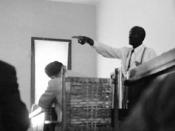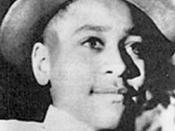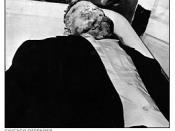The People of the Crucible were treated like animals. No one had a chance at defending themselves because in the judgeÃÂs eyes everyone except himself could be found guilty. This is the same in the Civil Rights Era. The whites believed that everyone with different colored skin were terrible people, people that should not be associated with. The story of Emmet Till explains very well some of the inhumane acts that went on during the civil rights.
In August 1955, a fourteen year old boy went to visit relatives near Money, Mississippi. Intelligent and bold, with a slight mischievous streak, Emmett Till had experienced segregation in his hometown of Chicago, but he was unaccustomed to the severe segregation he encountered in Mississippi. When he showed some local boys a picture of a white girl who was one of his friends back home and bragged that she was his girlfriend, one of them said, "Hey, there's a [white] girl in that store there.
I bet you won't go in there and talk to her." Emmett went in and bought some candy. As he left, he said "Bye baby" to Carolyn Bryant, the wife of the store owner. Although they were worried at first about the incident, the boys soon forgot about it. A few days later, two men came to the cabin of Mose Wright, Emmett's uncle, in the middle of the night. Roy Bryant, the owner of the store, and J.W. Milam, his brother-in-law, drove off with Emmett. Three days later, Emmett Till's body was found in the Tallahatchie River. One eye was gouged out, and his crushed-in head had a bullet in it. The corpse was nearly unrecognizable; Mose Wright could only positively identify the body as Emmett's because it was wearing an initialed ring. At first, local whites as well as blacks were horrified by the crime. Bryant and Milam were arrested for kidnapping even before Emmett's body was found, and no local white lawyers would take their case. Newspapers and white officials reported that all "decent" people were disgusted with the murder and proclaimed that "justice would be done." The Emmett Till case quickly attracted national attention. Mamie Bradley, Emmett's mother, asked that the body be shipped back to Chicago. When it arrived, she inspected it carefully to ensure that it really was her son. Then, she insisted on an open-casket funeral, so that "all the world [could] see what they did to my son." Over four days, thousands of people saw Emmett's body. Many more blacks across the country who might not have otherwise heard of the case were shocked by pictures of the that appeared in Jet magazine. These pictures moved blacks in a way that nothing else had. When the Cleveland Call and Post polled major black radio preachers around the country, it found that five of every six were preaching about Emmett Till, and half of them were demanding that "something be done in Mississippi now." Whites in Mississippi resented the Northern criticism of the "barbarity of segregation" and the NAACP's labeling of the murder as a lynching. Five prominent lawyers stepped forward to defend Milam and Bryant, and officials who had at first denounced the murder began supporting the accused murderers. The two men went on trial in a segregated courthouse in Sumner, Mississippi on September 19, 1955.The prosecution had trouble finding witnesses willing to testify against the two men. At that time in Mississippi, it was unheard of for a black to publicly accuse a white of committing a crime. Finally, Emmett's sixty-four year old uncle Mose Wright stepped forward. When asked if he could point out the men who had taken his nephew that dark summer night, he stood, pointed to Milam and Bryant, and said "Dar he" -- "There he is." Wright's bravery encouraged other blacks to testify against the two defendants. All had to be hurried out of the state after their testimony. In the end, however, even the incredible courage of these blacks did not make a difference. Defense attorney John C. Whitten told the jurors in his closing statement, "Your fathers will turn over in their graves if [Milam and Bryant are found guilty] and I'm sure that every last Anglo-Saxon one of you has the courage to free these men in the face of that [outside] pressure." The jurors listened to him. They deliberated for just over an hour, then returned a "not guilty" verdict on September 23rd, the 166th anniversary of the signing of the Bill of Rights. The jury foreman later explained, "I feel the state failed to prove the identity of the body." The impact of the Emmett Till case on black America was even greater than that of the Brown decision. For the first time, northern blacks saw that violence against blacks in the South could affect them in the North. In Mamie Bradley's words, "Two months ago I had a nice apartment in Chicago. I had a good job. I had a son. When something happened to the Negroes in the South I said, `That's their business, not mine.' Now I know how wrong. I was. The murder of my son has shown me that what happens to any of us, anywhere in the world, had better be the business of us all." Blacks, in the North as well as in the South, would not easily forget the murder of Emmett Till (Cozzens, The Murder of Emmet Till).
This is a bone chilling story that very easily represents the Crucible. This boy was taken and killed. He didnÃÂt do anything wrong yet he was taken from his home and murdered. Similar things happened in the Crucible. People were taken from there homes and accused of witchcraft on little or no evidence. These people were hanged on charges with no proof. I think that this is ridiculous that the human race can be so cruel and inconsiderate. How can we honestly tell ourselves that the U.S. is the best in the world when so much wrong has been committed on our soil? Yes, we did help during World War II but within twenty years we were treating people very similarly to how the Jews were treated.
I think that if we remember how we would like to be treated we can keep ourselves from having another situation like the Civil rights from happening again. E.D. Nixon once said, ÃÂWhat's the matter with you people? Here you have been living off the sweat of these washerwomen all these years and you have never done anything for them. Now you have a chance to pay them back, and you're too damn scared to stand on your feet and be counted! The time has come when you men is going to have to learn to be grown men or scared boys.ÃÂ I think that this is an amazing quote that can be used in every day life. We need to stand up for what we believe in, by doing so we can prevent this great country from having another national problem such as segregation. Mother Pollard said, ÃÂMy feets is weary, but my soul is rested.ÃÂ If we live by this quote as well we can prevent terrible things from happening. If we work until our feet are weary from so much good work towards preventing, then our soul will be rested and we will be able to live knowing that we fought for a constitutional country!Works CitedCozzens, Lisa. "The Murder of Emmet Till." Welcome to African American History!. 11/05/1999. Web. 28 Oct 2009. .





